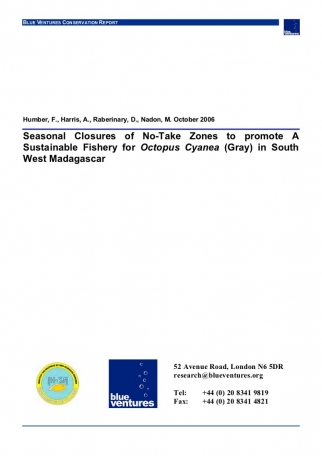The change from a subsistence to a cash-based octopus fishery in SW Madagascar has caused concerns over its long-term sustainability. Here, the results of the first two closures of an octopus No-Take Zone (NTZ) in the region, based on fisheries data collected between September 2003 and June 2006 are presented. The results show that the number and mean weight of octopus caught increased significantly after closure periods of the NTZ. However, the high intensity of fishing on the opening days reduced the potential longer-term benefits of the first NTZ closure, and a reduction in fishing pressure on the second opening lead to longer-lasting benefits.
This study demonstrates that seasonal, temporary closures of fishing sites are potentially a strong management tool in maintaining the sustainability of a traditional octopus fishery. The active participation and support of the local fishers was key to the success in the implementation and respect of the NTZ.












